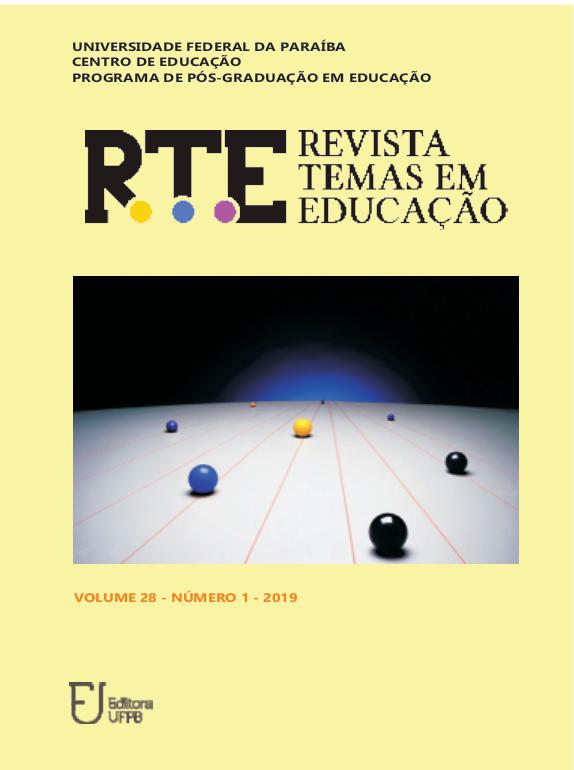EVALUATE, TEACH AND LEARN: DIALOGUES CONSTITUTIVE IN THE FORMATION OF TEACHERS
EVALUATE, TEACH AND LEARN: DIALOGUES CONSTITUTIVE IN THE FORMATION OF TEACHERS
DOI:
https://doi.org/10.22478/ufpb.2359-7003.2019v28n1.41945Keywords:
Evaluation., Tests., Formations Meetings., Investigation-Action.Abstract
Thinking about evaluation in school is an intrinsic part of the process of teaching and learning requiring understanding about some limits and possibilities that go through the educational context.A topic that requires a study tounderstand the process of evaluation of an evaluation instrument.The dada of the research were produced through recordingsof two formation meetings through investigation-action, involving the triad (school teacher, teacher trainers and graduated/trainees) in a collaborative way indialogues and critical thinking with focus on evaluation of learning. The thematic interpretation axes were constructed from the concepts of different strategies of evaluation manifested by the three interviewed. Finally, the way indicated evidences through for some the speech concerning the potentialities and difficulties to be confronted when the wish is an evaluation of learning with formation values effective in the process of teaching, aiming at transforming the deterministic strategies to emancipation of the subject’s educational context.
Downloads
References
CARR, W. KEMMIS, S. Teoria crítica de la enseñanza: investigación-acción en la formación del profesorado. Barcelona: Martinez Roca, 1988.
ESTEBAN, M. T. O que sabe quem erra? Reflexões sobre avaliação e fracasso escolar. Petrópolis, RJ: De Petrus et alii, 2013.
ESTEBAN, M. T. Pedagogia de Projetos: entrelaçando o ensinar, o aprender e o avaliar à democratização do cotidiano escolar. In: SILVA, J. P. da. HOFFMANN, J. ESTEBAN, M. T. (Org.). Práticas avaliativas e aprendizagens significativas. Porto Alegre: Mediação. 8.ed. 2010. p. 83-89.
FREIRE, P. Pedagogia da indignação: cartas pedagógicas a outros escritos. São Paulo: UNESP, 2000.
FREIRE. P. Pedagogia da Autonomia: saberes necessários à prática educativa. São Paulo: Paz e Terra, 1996.
GÜLLICH, R. I. da C. O livro didático, o professor e o ensino de Ciências. Ijuí: Unijuí, 2013. [Tese de Doutorado].
HOFFMANN, J. M. L. Avaliação Mediadora: uma prática em construção da pré-escola à universidade. Porto Alegre: Mediação, 2003.
LIBÂNEO, J. C. Didática. São Paulo: Cortez, 1994.
LUCKESI, C. C. Avaliação da aprendizagem escolar: estudos e preposições. 19. ed. São Paulo: Cortez, 2008.
LÜDKE, M.; ANDRÉ, M. E. D. A. de. Pesquisa em educação: abordagens qualitativas. São Paulo: EPU, 1986.
MALDANER, O. A. Formação Inicial e Continuada de Professores de Química: Professores/Pesquisadores. Ijuí, RS: Unijuí, 2000.
MORETTO, V. P. Prova: um momento privilegiado de estudo, não um acerto de contas. 9. ed. Rio de Janeiro: Lamparina, 2010.
ROSA, M. I. F; SCHNETZLER, R. P. A investigação-ação na formação continuada de professores de Ciências. Ciência & Educação, Bauru, v. 9, n.1, p. 27-39, 2003.
SAUL, A. M. Avaliação Emancipatória: desafio à Teoria e à Prática de Avaliação e Reformulação de Currículo. São Paulo: Cortez, 1994.
SCHÖN, D. A. Educando o profissional reflexivo: um novo designe para o ensino e a aprendizagem. Porto Alegre: Artimed, 2000.
UHMANN, R. I. M. Interações e Estratégias de Ensino de Ciências com foco na Educação Ambiental. Curitiba: Prismas, 2013.
UHMANN, R. I. M.; ZANON, L. B. O paradigma da avaliação escolar em discussão na docência em ciências/química. 33º EDEQ (Movimento Curriculares da Educação em Química: o Permanente e o Transitório), 2014.
Downloads
Published
How to Cite
Issue
Section
License
Authors who publish in this journal agree to the following terms:
. Authors retain the copyright and grant the journal the right to first publication, with the work simultaneously licensed under the Licença Creative Commons Attribution that allows the sharing of the work with acknowledgment of authorship and initial publication in this magazine. . Authors are authorized to assume additional contracts separately, for non-exclusive distribution of the version of the work published in this journal (eg, publishing in institutional repository or as a book chapter), with acknowledgment of authorship and initial publication in this journal.
. Authors are permitted and encouraged to publish and distribute their work online (eg in institutional repositories or on their personal page) at any point before or during the editorial process, as this can generate productive changes, as well as increase impact and citation of the published work (See O Efeito do Acesso Livre).



















